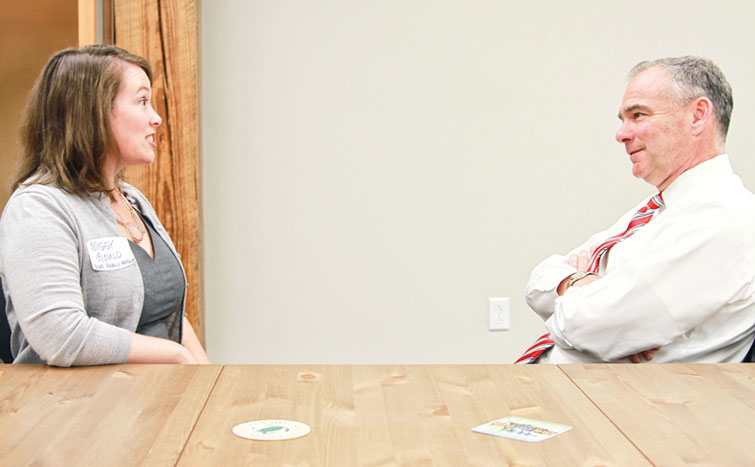The Noble Work of Public Service
- By Betsy Rhame-Minor, ’01
- Published

The challenges include long hours, job instability, financial insecurity, travel, and dealing with difficult personalities. But the Meredith alumnae who have chosen a career in politics say the rewards outweigh the demands.
Kimberly Spell, ’94, has been in politics for 20 years. Her work has included being national press secretary for General Wesley Clark during his bid for the U.S. Presidency, deputy communications director for Vice President Al Gore during his presidential campaign, communications director for John Edwards’ U.S. Senate campaign, press secretary and speechwriter for U.S. Representative David Price’s press secretary, and speechwriter and assistant press secretary for North Carolina Governor Jim Hunt.
“Public service is one of the most noble things you can do with your life,” said Spell. “It was especially great working for [Representative Price and Governor Hunt] because I was not only giving back to the state where I’m from, but working for two people I admired.”
Having an Influence in Policy Making
Spell found intrinsic benefits resulted from the hard work required by the political field.
“Having a voice and influence in the policy making process … it gives you a chance almost without exception to work with talented, dedicated people and give back in ways you would otherwise [not be able to],” Spell said.
Whether their interest in politics was there before enrollment or discovered as a student, political involvement early and often is common among Meredith women.
For Amanda Eubanks, ’10, an interest in politics started before she became a Meredith student. She volunteered for her first political campaign in high school and began learning how elections work.
“I chose this career path because I have been interested in presidential history and the political process from an early age,” Eubanks said. “After entering Meredith I continued to benefit from opportunities to volunteer, intern, and work on campaigns, which deepened my comprehension of the political landscape and reinforced my determination to build a political career.”
Eubanks isn’t unique in that involvement in politics as interns or volunteers can lead to work after graduation. For some alumnae, advice from a professor sparked an interest in politics and started them on a political path.
Lindsey de La Fosse Turnau, ’06, was a history major planning to get K-6 certification until Professor of History Michael Novak suggested she apply for an internship with the North Carolina Republican Party. Turnau became an intern working for the Bush/Cheney campaign in 2004 at the state level.
That led her to replace education with a minor in communication her junior year. The pairing of history classes with communication, along with the internship, changed her course.
As an intern Turnau worked one to two days per week making copies, setting up spreadsheets, and doing data entry. She attended the inaugural ball in Washington, D.C., for Bush/Cheney and remained an intern for the Republican Party until she graduated. Turnau’s first job out of college was as the director of member relations for the North Carolina Republican Party.
Engaged in Politics Day One
Many alumnae began their advocacy work as students. As a political science major Julia Marie Adams, ’06, advocated for an elevator in Lux Hall, and she’s still doing this type of work today.
Now Adams lobbies for intellectual and developmental disability policies for the Marketing Association for Rehabilitation Centers, The ARC of North Carolina, the Autism Society of North Carolina, and North Carolina Association of Rehabilitation Facilities.
“I advocate strongly for a community without a solid voice,” she explained. “I am hired to represent a community and the ideals that community holds. I make sure my clients’ needs are being satisfied at the general assembly.”
In North Carolina’s capital city, work with political campaigns, interest groups, and state government agencies is abundant.
“Our location in the state capital provides valuable opportunities for students,” explained Clyde Frazier, professor of political science. “Students can really get started.”
Political science coursework at Meredith covers federal, state, and local government. A public leadership practicum puts on the Meredith Votes Campaign for voter registration and turnout on campus.
“When I came to Meredith I was the only person teaching politics so I really taught it all,” said Frazier, who began teaching at Meredith 31 years ago and retires this summer.
The history and political science program turns out students ready to work in all areas of the political arena with sharpened public speaking, writing, and critical thinking skills.
“We don’t train someone for an ordinary slot,” said Frazier. “These are students engaged from day one.”
Emily Hawkins, ’14, credits Frazier for helping to shape her research and coursework.
“Dr. Frazier helped advise my honors thesis on women in politics and has been a constant cheerleader for me,” she said. “I held fundraising and development internships … and was selected to intern on the finance team on Senator [Kay] Hagan’s campaign last fall. When there was a full-time opening in December, I interviewed for the job and was selected.”
Now Hawkins is finance assistant for Hagan for U.S. Senate, Inc. Previously she interned at the White House, EMILY’S List, and with Representative Deborah Ross in the North Carolina General Assembly.
Love of Politics Strengthened by Meredith Experience
For Missy Neff Gould, ’01, a love for politics and policy was already there before she was a Meredith student.
Once at Meredith, Gould said, “I started gravitating more toward policy-based stuff. I was initially drawn to a particular set of issues, [the environment]. I grew up as a kid spending a lot of time outdoors. Small things planted the seed.”
The history and politics major found she was in good company. She and her classmates would often gather in the Lux lounge.
“We would read The Economist and Christian Science Monitor,” said Gould. “We would sit around and discuss robust issues. We had good, thoughtful, open discussion.”
After graduation, Gould worked as a lobbyist and political consultant, and as the assistant secretary of natural resources for Virginia Governor Tim Kaine. Now she is market director of community and government relations for South Central Virginia’s LifePoint Hospitals.
In this role, Gould does policy work and strengthens local relationships for this hospital.
“Now I’m interacting with the community, trying to pass [a] kind of Medicare expansion,” she explained. “It’s important for hospitals.”
The Confidence to Have an Opinion
Kasey Ginsberg, ’10, also credits her time at Meredith with making her successful in her current role as policy advisor for the Speaker of the North Carolina House.
“Because of the confidence I learned at Meredith College…I can be bolder,” she said. “I can say what I need to say. Small class sizes force you to participate. You have to have an opinion on the issue.”
Turnau has also benefitted from the skills she developed while at Meredith.
“One of the things Meredith teaches is that we can be leaders,” she explained. “I knew I was a proven leader and I just needed to prove to [my coworkers] that I could be their leader.”
Adams was prepared for her role as a lobbyist by the debates and differing opinions in her classes at Meredith.
“What I learned at Meredith were the skills to look at the argument and present a counter argument,” she said. “Meredith is a thinking school.”
While some alumnae, like Gould, Ginsberg, Adams, and Turnau, have transitioned out of campaign work, others choose to remain in that part of politics. Hawkins and Eubanks both work as political fundraisers.
“I help raise the funds that the campaign will use to get Kay [Hagan]’s message to voters,” Hawkins explained. “Fundraising specifically requires a desire to interact with people regularly and the ability to be persistent. I always knew I wanted to have a job that required me to interact with others and I have a deep passion to elect more Democratic women to political office. Fundraising allows me to do both and that made it a natural choice.”
Eubanks is a political strategist and campaign operations with Greenprint Strategies in Durham, N.C.
“I am responsible for helping democratic candidates, from the bottom of the ballot up, develop and execute their fundraising, communication, and field operations,” she said.
Eubanks uses what she learned at Meredith College in her career.
“Meredith nurtured my passion and granted me the time and resources to develop my research abilities, critical thinking, and communication skills, which are all vital to a successful political career.”
Across the different types of political jobs the rewards balance out the demands.
Said Ginsberg, “There are so many little bills, little issues that improve people’s lives,” she said. “It’s cool to know that I have an impact.”
This article originally appeared in the Summer 2014 issue of Meredith Magazine.
News Director
316 Johnson Hall
(919) 760-8087
Fax: (919) 760-8330


3800 Hillsborough Street Raleigh, NC 27607-5298 | (919) 760-8600 Fax: (919) 760-8330 | © 2022 All Rights Reserved.